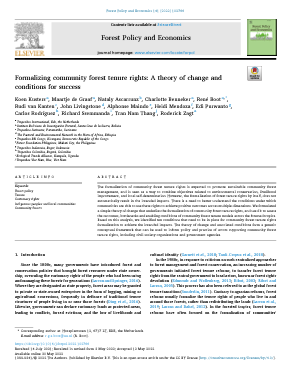Location
What is ScienceDirect
Elsevier’s leading platform of peer-reviewed scholarly literature.
University libraries and institutions offer ScienceDirect access to their communities of researchers.
Researchers, teachers, students, healthcare and information professionals use ScienceDirect to improve the way they search, discover, read, understand and share scholarly research.
Members:
Resources
Displaying 1 - 5 of 284The value of so-called ‘failed’ large-scale land acquisitions
The land rush has remained, and is likely to remain, a significant global phenomenon despite waning international media attention. The scope of the phenomenon is likely to be wider than previously thought.
Formalizing community forest tenure rights: A theory of change and conditions for success
The formalization of community forest tenure rights is expected to promote sustainable community forest management, and is seen as a way to combine objectives related to environmental conservation, livelihood improvement, and local self-determination. However, the formalization of forest tenure rights by itself, does not automatically result in the intended impacts. There is a need to better understand the conditions under which communities are able to use these rights to achieve positive outcomes across multiple dimensions.
The ambiguity of transparency in the artisanal and small-scale mining sector of Tanzania
This paper examines the newly established mineral markets in Tanzania. These markets aim to ensure tax revenue collection and enhance the transparency of mineral trade within the artisanal and small-scale mining sector. Drawing on ethnographic fieldwork in the Geita Region, we show that the enhanced transparency facilitated by these new markets has benefitted artisanal and small-scale gold miners. However, the living conditions of the miners and opportunities for profit have not changed significantly and the miners do not expect that a more transparent value chain will improve their lives.
Land tenure legislation and soil security concerns in Cameroon
This chapter explores the interface between land tenure rights and soil security and screens through the Cameroonian land tenure legislation in order to identify relevant provisions that guarantee soil security.
How will land degradation neutrality change future land system patterns? A scenario simulation study
Land degradation is a major global issue and achieving a land degradation-neutral world is one of the Sustainable Development Goals. However, striving for land degradation neutrality (LDN) is challenged by increasing claims on land resources and could result in major land use conflicts. The aim of this study is to demonstrate how LDN can be implemented in land system modelling and how achieving LDN alongside sufficient supplies of food, timber and shelter could affect future land system patterns, using the Republic of Turkey as a case study.


